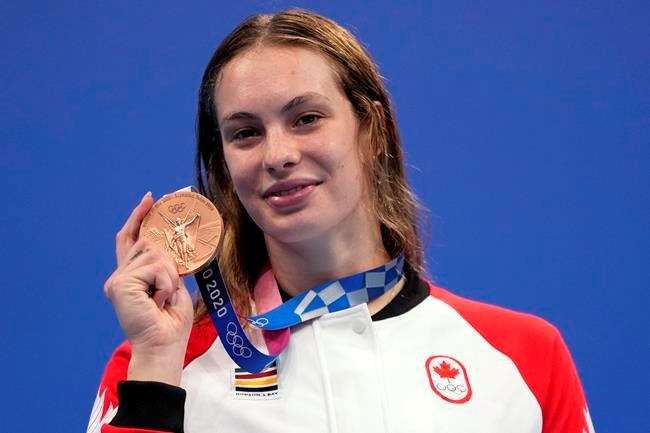Canada's most decorated summer Olympian doesn't have much time to rest and take it in.
Penny Oleksiak swam into Canada's record books on Wednesday after winning a bronze in the women's 200-metre freestyle. Her sixth career medal is the most for any Canadian in the Summer Games and ties her for tops overall with speedskater Cindy Klassen and speedskater/cyclist Clara Hughes.
And, with several races left to go in Tokyo, the 21-year-old Oleksiak isn't done yet.
"It’s definitely crazy," she said. "I don’t think I’ve had time to soak it in yet."
Next on her list is trying to defend the gold medal she won at the 2016 Rio Rio de Janeiro Games in the women's 100-metre freestyle. Oleksiak took the first steps toward that goal later Wednesday, as she swam the 100 heats advanced to the semifinal. She's also expected to swim in two more relays.
Oleksiak's bronze moved her past the five medals of rowing's Lesley Thompson-Willie and track and field's Phil Edwards. She adds it to the silver she won as part of the women's 4 x 100 freestyle relay team on Sunday, and the four she won in Rio as a 16-year-old.
Five years after that initial burst of success, Oleksiak made it clear she hasn't lost her love of racing on the world's biggest stage.
"I just love the Olympics," Oleksiak said. "I think they're so fun. Just knowing the whole world is watching is super crazy."
During Wednesday's race, Oleksiak led at the first turn, but was fourth at 150 metres. She fought her way back into podium position and held off a late push by China's Junxuan Yang to touch the wall in one minute 54.7 seconds. Australian Ariarne Titmus won gold in Olympic record time of 1:53.5, while Siobhan Haughey of Hong Kong captured second at 1:53.92.
Oleksiak's initial reaction after touching the wall to win a historic medal?
"My legs are killing me right now!" she said with a laugh.
Oleksiak's medal was the fourth produced by the Canadian women's swim team in as many days following the relay silver, Maggie Mac Neil's butterfly gold and Kylie Masse's backstroke silver.
Canada had nine medals (two gold, three silver, four bronze) entering Thursday's competition. Canada sat 11th in both the official and total medal standings.
Japan led the medal standings for a third day in a row with 13 gold medals, one more than China. The United States had the most overall medals with 31.
On Wednesday, in addition to Oleksiak, a number of Canadians qualified for semifinals in their events. Those included Kelsey Wog in the 200-metre breaststroke, Markus Thormeyer in the 200-metre backstroke and Kayla Sanchez in the 100-metre freestyle semifinals. The women's 4x200-metre freestyle relay team qualified for the finals.
At the Olympics there are all kinds of victories, and not all of them result in medals or the kind of dominance Oleksiak has enjoyed.
Jessica Sevick and her partner Gabrielle Smith had a disappointing sixth-place finish in the final of the women's double sculls, crossing the line more than 12 seconds off the winning boat's time despite putting up the fourth-fastest time in the competition's semis.
As a child 20 years ago, Sevick suffered a traumatic brain injury on the luge track at Calgary's Olympic Park. Her parents were told she might not survive or, if she did, could be severely disabled.
Even as she fought back tears of disappointment on Wednesday, Sevick acknowledged the daunting odds she'd overcome to be there at all.
"It's just hopefully a message not to ever be limited by your circumstances," she said. "And that any sort of physical disability, or something that you can't control that happens to you, is not something that has to define you."
Another sort of victory went to canoe racer Haley Daniels, who became one of the first women to compete in women's canoe slalom after fighting for years to have the sport included in the Olympics.
The 30-year-old from Calgary didn't advance out of Wednesday's qualifying heats of the women's C-1 event but made history just by getting into her boat. Daniels was among a group of international paddlers who pressured the International Canoe Federation for gender equity in the Olympics.
"I know we are always fighting for results, but I've had to fight for 12 years just to get here," she said. "And so С����Ƶ here is really special for me."
In 2017, the International Olympic Committee announced it was replacing some men's paddling events with women's events.
Other Canadian athletes in action on Wednesday included boxer Tammara Thibeault, who will advance to the quarterfinals after winning her middleweight bout against Nadezhda Ryabets of Kazakhstan. Fellow Canadian Caroline Veyre was eliminated in the women's featherweight quarterfinals.
In the pool, Sydney Pickrem of Clearwater, Fla., a dual Canadian-U.S. citizen, was sixth in the 200-metre individual medley.
Canadian gymnast Ellie Black was forced to withdraw from Thursday's all-around final event at Tokyo Olympics with an left ankle injury. Black said she aggravated an injury she suffered earlier in the year when she landed awkwardly after training on balance beam.
"Hurting it here is difficult, it's frustrating, it's upsetting. But I've been through a lot of ups and downs, and this was just another one that I had to overcome," Black said.
The 25-year-old from Halifax said she hoped to recover in time for next week's balance beam final.
There was also disappointment for tennis players Felix Auger-Aliassime and Gabriela Dabrowski, who lost their opening match of the Tokyo Olympics' mixed doubles competition Wednesday and officially ended Canada's hopes for a tennis medal.
This report by The Canadian Press was first published July 28, 2021.
The Canadian Press
Note to readers: This is a corrected story. A previous version had omitted the last name for Hong Kong swimmer Siobhan Haughey.




